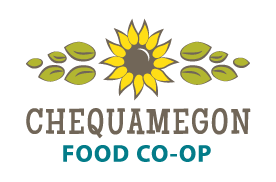Interested in Serving on our Board of Directors?
Please download our application and return it via email to kianaa@cheqfood.coop or by dropping it off at the store. Don’t forget to include a photo!
What does the Board Do?
Chequamegon Food Co-op’s Board of Directors operates under Policy Governance. They work to set the policies and direction of the cooperative as a business. They do not control any part of operating the store other than hiring the general manager. Operation of the store is controlled by the general manager, who works with store staff to meet the ends of the Co-op.
Policy Governance in a Nutshell
Policy Governance is a trademarked name for a system of integrated concepts and principles that describe the job of any governance board. The system was developed by John and Miriam Carver and is free for any organization to use. The system is trademarked in order to preserve its integrity as its adoption and use becomes increasingly widespread.
The Policy Governance model envisions a board playing a leadership role focused on the big picture and visioning for the future, rather than being directly involved in the day-to-day operations and management of its organization. The leadership authority of the board is derived from its role as a representative of member-owners, not from its relationship to management. Under a Policy Governance system, the board fulfills its responsibilities by implementing policies to guide management and by monitoring compliance with those policies on a cyclical basis, or more frequently as necessary or desirable. Although the board is responsible for the development of specific policies, policy development is informed by the organizational goals, vision, and values expressed by the member-owners.
The board monitors management under two sets of policies: the Ends Statements and the Executive Limitations policies. The Ends Statements define the big picture expectations for management and the future of the organization. They also identify the intended recipients of the benefits or services the organization provides or intends to provide, and the acceptable costs or relative priority of providing the intended benefits or services. Ends Statements are comparable to mission or vision statements in that they tend to set forth a model for idealized long term results, but they differ from mission or vision statements in the context of Policy Governance because they also serve the purpose of setting forth expectations to which management may be held accountable.
Executive Limitations set forth the operational means and boundaries that define the parameters under which management is expected to work toward achievement of the Ends. Although the board has discretion to craft policies that are as broad or as specific as the board considers necessary, the Executive Limitations are not intended to provide directives or mandates to management, but to allow for management to exercise broad discretion in defining its management methods and activities so long as those methods and activities do not fall outside the range of what the Executive Limitations define as acceptable. For this reason, Executive Limitations are commonly stated in the negative: “The general manager shall not…” As a rule of thumb, Executive Limitations should be stated as broadly as possible while still being accurate, and should stop at the point where any reasonable interpretation by management would be acceptable.
Under Policy Governance, the board also creates policies to guide its own conduct. The Board Process policies establish the board’s methodology for fulfilling its role and responsibilities. The Board-Management Relationship policies define the scope of board and management authority and the board’s processes for monitoring policy compliance.
Monitoring of management-accountable policies (Ends Statements and Executive Limitations) is accomplished by presentation to the board of a report from management that identifies evidence of compliance with the particular policy being monitored or acknowledgment of non-compliance. Non-compliance is not inherently regarded as a failure, so long as acknowledgment of non-compliance is accompanied by a reasonable explanation and a plan for achieving compliance within a reasonable time frame.
When the board reviews a report it should consider whether the information presented as evidence of compliance represents a reasonable yardstick by which to measure compliance, and whether management’s interpretation of the policy is a reasonable interpretation. If so, the board may accept the report without further review. If the evidence is not sufficient to demonstrate compliance or if the policy interpretation is not reasonable, the board then considers whether or not to impose any consequences for non-compliance. Throughout the process, the board considers whether the policy as written accurately states the board’s intent. If not, the board will meet again to discuss policy revisions. See the decision tree attached below for a flow model of the policy review process.
In summary, Policy Governance is a tool that helps maintain a clear distinction between the roles of the board and management and that empowers management to use any means available to achieve organizational goals within a framework of reasonable limitations. Policy Governance empowers a board to focus on the linkage between the organization and the visions and values of member-owners by providing a framework for monitoring operations that can enable the board to lay the conceptual groundwork for the organization’s future with confidence that the operations are being taken care of by diligent and competent professionals.
Policy Governance is an ongoing, evolutionary process. As the Coop board and future boards work with the basic policies we have adopted as a starting point, existing policies will be amended and new policies may be added to the register. Member input is vital to the board’s ability to define and redefine its policy goals and the board invites everyone to join the conversation, whether it’s through the forum on this website, by email, or by personal communication with a board member.
To learn more about how our Co-op Board operates, please read Policy Governance.





